Pauline Cushman, Actress and Union Spy
The woman who became famous as Pauline Cushman was born under the name Harriet Wood in New Orleans in 1833. Her father was Spanish, and her mother was French – two nations that had both ruled the Louisiana colony before the USA bought it from Napoleon in 1803. Harriet’s father had fled Spain after the liberal coup which ousted King Ferdinand VII in 1820, and took refuge in the south of France (ironically, at the time a much more conservative place). There he met and romanced Harriet’s mother, though her family (prosperous vineyard owners) strongly disapproved of the match. So the pair eloped across the Atlantic to America, where her father Anglicized his name and became a merchant. Eventually his parents relented and joined him in the city, and Harriet grew up listening to her grandfather’s tales of fighting for Napoleon as a Spanish conscript. Harriet’s father’s business was prosperous at first, but by 1843 a run of bad luck led to him being enough in debt that he decided to abandon both the business and the city. So the Woods moved north to Grand Rapids, Michigan.
At the time Grand Rapids was a small town of around 1500 people, which had just incorporated as a village five years earlier. It was definitely a town on the up, though, and a good place for Harriet’s father to make a fresh start. The primary business going on in the town was trade with fur trappers and trade with Native Americans, though gypsum was also beginning to be mined in the area. The timber and furniture trade that would propel Grand Rapids into being Michigan’s second largest city was still decades away. Harriet was the only girl in a family of seven children, and she grew up playing rough and tumble games with her siblings and with the other children in town. [1] As the town and Harriet both grew, however, tales began to reach them of the other growing cities in America. Premier among them were stories of New York, and Harriet soon became determined to move to the big city.
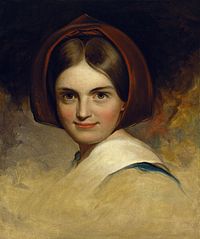
At this point, we should say that the preceding details come from Harriet’s official biography, which is long on floridity and short on detail. We don’t know her mother and father’s names, or her family’s original surname. In fact, the only member of her family who we do know the name of is her brother William. In 1851 Harriet moved to New York and took the stage name of Pauline Cushman, [2] and it’s entirely possible that she invented her whole backstory in order to lend herself some romance. There was some romance in her current life as well – while her company were touring in New Orleans (her childhood home, if she was to be believed) she met a musician named Charles Dickinson. The two hit it off, and when Pauline’s company left the city Charles went with them. On the 7th February 1853 they were married.
Pauline soon became pregnant and retired from the stage in order to raise her children. They had two – a son named Charles after his father, and a daughter named Ida. The family lived a quiet life in Cleveland, Ohio – up until that fateful April of 1861 when the American Civil War broke out. Both Charles and Pauline were loyal supporters of the Union, both having experienced street life in New Orleans and being well aware of how miserably slaves in the South were treated. (In fact, both would have been raised as children on stories of the infamous slave-killer Delphine Lalaurie, who was exposed in 1834.) So Charles signed up to the Union Army, joining the 41st Infantry as a drummer. He soon fell prey to the greatest risk facing soldiers at the time – dysentery. He was discharged and sent home, but in December of 1862 he died of the illness.
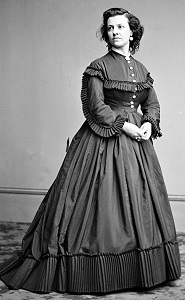
With her husband dead, Pauline was forced to go back onto the stage to support her family. She appeared in works like as Seven Sisters, written by the English-born playwright and actress Laura Keene. [3] The play was notable for being constantly rewritten by Keene to reflect current events, making it a distant precursor of modern topical sketch shows. In its initial form it had included both pro-Union and pro-Confederate viewpoints (the latter contributed by theater owner and Confederate sympathizer John T Ford), but with the outbreak of open war it had shifted into being entirely pro-Union when shown in the North, and pro-Confederate when shown in the South. By 1863 the play was no longer being rewritten and had been retired in New York, but it was being toured along the border states as both entertainment for the troops and propaganda for the locals. Pauline had a reasonably major role in the play – she played Plutella, the female counterpart of Pluto. In that character she appeared in several sketches, including some that involved enough revealing attire to make her especially noticeable to the men in the audience. In addition she was one of thirty four “daughters of Columbia” who represented the thirty four American states. Pauline played South Carolina, a rebel state, which might explain what happened next.
At the time the touring company were in Louisville, Kentucky – a state that was officially part of the Union, but in practice was full of Confederate sympathizers. Two of these were actually ex-rebel officers who had been released on parole named Colonel Spear and Captain Blincoe. They became friendly with Pauline, and then made her an offer. In one of Plutella’s scenes she played the part of a man drinking wine with a friend, and she had to give a toast. They offered her three hundred dollars to change the words of the toast to a pro-Confederate rallying cry. Pauline, of course, had no intention of doing this. Not only did it fly against her own beliefs, but she knew it would mean she would be fired on the spot. But she told them she’d “think it over”, and then immediately went to see the local provost-marshal, Colonel Orlando Moore. [4] Moore was an intelligent man, and to her surprise he advised her to accept the Confederate offer, and promised that to do so would in fact let them help the Union. Pauline was nervous, but Moore promised her that he’d make sure that men would be there to protect her if the crowd turned against her. So on the fateful night, to a crowd packed with Confederate sympathisers who had been told to “expect something special”, Pauline raised her glass and shouted:
Here’s to Jefferson Davis and the Southern Confederacy. May the South always maintain her honor and her rights!
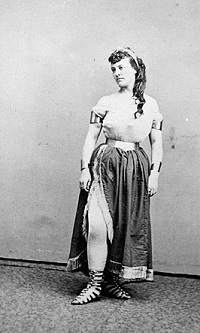
The crowd was immediately thrown into disarray, and a near riot broke out between the two sides in attendance. John McDonough, the owner of the company, ran onto the stage and asked Pauline what was going on. Playing her part to the hilt, she declared she “wasn’t afraid of the whole Yankee crew, and would do it again”. Most of the other members of the company fled into the back, but some stayed on stage and denounced her as a traitor. The local police even turned up to arrest her, but the theatre owner persuaded them to let her go on her own recognizance, and instead she was bound over to turn up at their headquarters the next morning. There she was greeted by Colonel Moore and General Boyle, who congratulated her on her performance. Then they offered her a post in the Union intelligence service. The rest of their plan was that she use this incident to get herself completely tarred as a Confederate sympathizer, then infiltrate them. It was the acting challenge of a lifetime, with her life as the stakes. Pauline accepted immediately.
When she returned to her hotel, Pauline found her dismissal waiting for her, though Mr Wood, the theatre owner, was kind enough to give her the money for her notice period in lieu. On the advice of Colonel Moore, she moderated her language in public (as if she had been heavily reprimanded), but in private she gave vent to her “true feelings”. This led to her quickly becoming a confidante of many of the Confederate sympathisers in town, including the manager of the boarding house she was staying at. This confidence allegedly led to her first immediate success, when she found out that the old woman was secretly poisoning the injured Union soldiers who had been billeted with her. In order to preserve Pauline’s cover, the authorities didn’t arrest the woman immediately – but they did make sure she no longer had any soldiers on the premises.
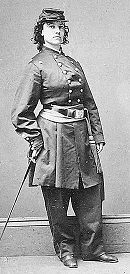
Much of the details of Pauline’s work for the Union intelligence service were kept classified, so to a large extent we’re forced to rely on her “official autobiography”, a sensationalised work that (among other things) manages to entirely fail to mention her first husband and her children. It gives several tales of her exploits in Louisville, though most seem to be ones that wouldn’t really require her affiliation with the Confederate cause. An entire chapter, for example, is given over to an elaborate scheme where Pauline disguised herself as a man and attached herself to a plot to smuggle medicine south across the lines. In relaity though, Pauline’s cover was vital in the next stage of the Union’s plans for her, though – moving her out of Louisville and into Confederate territory.
The opportunity Pauline had been waiting for eventually came in the form of JR Allen, owner of the New Nashville Theatre in Tennessee. He met the owner of the Louisville Theatre while both were in Cincinnati, and got an earful about Pauline’s scandalous behaviour on his stage. Allen was smart enough to see that what was a scandal in Union-held Louisville was box office gold in Nashville (which had only recently been captured from the Confederacy), and he immediately offered Pauline a position in his theatre. The problem of getting to Nashville he left to her – while she could easily have procured a pass from Colonel Moore, it would hardly have kept her cover intact. Instead she got one of her secessionist “friends” to take her trunk, sweet-talked her way onto the train by claiming to want to say goodbye to a friend, then bluffed her way past the carriage guard by showing him the pass from Allen. With that accomplished, Pauline made it across the border and into the lion’s den.
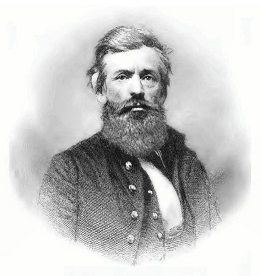
By May of 1863 Pauline Cushman was listed as a proud member of the company at the New Nashville Theatre. Ironically also present there that month was John McDonough, presenting Seven Sisters. It’s not recorded whether Pauline reprised her role in the play. However Pauline’s stay in Nashville was a short one. In June she was summoned to a secret meeting with William Truesdail, a high ranking Union intelligence officer. He had a plan – one which would involve a great deal of risk, but which had an equally high potential payoff. As part of Pauline’s regular debriefings she had mentioned that one of her six brothers was an officer in the Confederate Army. Truesdail’s plan was that she take advantage of a Confederate policy where sympathisers in disputed territory like Nashville were able to seek refuge in Confederate territory, [5] with the impetus given by her expulsion from Nashville for her “Confederate sympathies”. Once there she was to visit each of a given list of Confederate army bases, supposedly searching for her brother. There she was to pass on carefully crafted disinformation if asked about affairs in Tennessee, and to socialize with the officers (who would naturally flock to this attractive actress). She was not to deliberately seek out information, but she was to carefully memorise all the gossip she heard – especially relating to people operating across the lines.
If Pauline had stuck to the plan, she’d probably have been okay. Things went well at first – she found a smuggler willing to transport her across the lines, and she made her way to Columbia in South Carolina. This city had the distinction of being almost in the centre of Confederate territory, which made it both a nexus of supply lines and a common meeting place for Confederate officials and officers. Pauline played her role of persecuted sympathizer driven from her job to the hilt, and picked up both a great deal of valuable intel and a healthy number of social contacts. Among them were several Confederate officers, who arranged for her to visit the army camp at Shelbyville in Tennessee to “search for her brother”. She hoped to meet General Braxton Bragg, commander of the local army, but he was away from the camp. So instead Pauline charmed her way into the confidences of the officers present, and soon discovered that one of them happened to have copies of the plans for Confederate defences all along the line. The opportunity was too great to pass up, and after arranging for a pretext to get her away, Pauline stole the plans. Unfortunately for her, the theft was discovered and the plans were found hidden in her boot. [6]
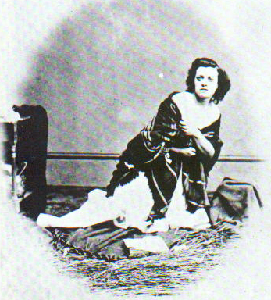
As a result of this, Pauline did get to meet General Braxton Bragg after all. Unfortunately it was in a military court, with her as the defendant. The evidence was inarguable, and Pauline was found guilty of espionage. The sentence for a spy in wartime was unambiguous – death by hanging. Luckily for Pauline the Confederate officers were reluctant to hang a woman, and she was able to further stall them by exaggerating an illness she had picked up in prison. It wouldn’t have worked forever, but when you’re facing a death sentence every fresh day is a new ray of hope. And for Pauline Cushman that hope blossomed on June 27th 1863, when advancing Union forces led the Confederate army to pull out of Shelbyville and retreat southwards. Pauline was either forgotten or abandoned in the confusion, and she was released by the victorious Yankees.
Naturally, Pauline’s spying days were over. However she represented a fantastic propaganda opportunity for the Northern government – a ready-made heroine, who had literally risked her life for the Union. Pauline was given the brevet rank of Major, and had written commendations from both President Abraham Lincoln and General/future president James Garfield. She immediately cashed in on this fame, starting a lecture tour as “Major Pauline Cushman” and spinning tall tales of her exploits. She even spent some time at PT Barnum’s famous American Museum in New York. In 1865 a man named Ferdinand Sarmiento adapted her stage show into a book, the Life of Pauline Cushman. It was the high point of Pauline’s fame.
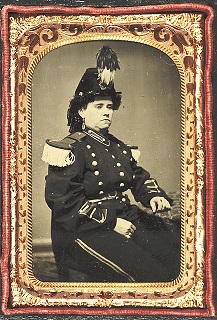
Unfortunately, the end of the war also meant the waning of Pauline’s drawing power. She continued to tour as “the famous lady spy”, but people gradually grew bored of her retelling the same tales. Equally unfortunately, her acting ability had suffered due to neglect. Pauline’s life was also marked by personal tragedy, as one of her children died of illness in 1868. (Which child it was, and what happened to the other one, isn’t recorded.) She moved to San Francisco and married a man named August Fichtner. He soon fell ill though and died in 1873. Her third husband was a man named Jere Fryer, who ran a hotel in Casa Grande, Arizona. They were married in 1879 and adopted a daughter named Emma. Jere was elected the Sheriff of Pinal County, and for a while life was good. But in 1890 Emma died, and Pauline’s marriage didn’t survive the grief over her death. She moved back to San Francisco, where a combination of rheumatism and arthritis soon saw her hopelessly addicted to painkillers. She died in 1893, aged sixty years old, of a laudanum overdose – whether accidental or deliberate is impossible to say.
Though Pauline’s fame had faded, she was a member of the Grand Army of the Republic, a Civil War veteran’s society, and they arranged for her funeral. They also ensured that she was buried with the full military honours befitting her rank of major, and she was laid to rest in the Officer’s Circle of the San Francisco National Cemetery, more commonly known as the Presidio. Her tombstone reads simply “Pauline Cushman, Union Spy”. Forgotten in life, in death she was once again recognised for the risks she ran for her country.
Images via wikimedia except where stated.
[1] Pauline’s official biography includes a fanciful tale of her being courted by a young Native American man in her teenage years, though she ultimately decides to reject him.
[2] She borrowed the surname from Charlotte Cushman, a famous actress of the time (and one of the first openly lesbian American celebrities).
[3] Laura Keene is nowadays mostly remembered for being the lead actress in the play Abraham Lincoln was watching when he was assassinated.
[4] Colonel Moore would later that year become famous for his victory at the Battle of Tebb’s Bend, where his force of 1000 men held off a Confederate army twice their size, preventing a planned punitive raid on Kentucky. Before the battle began the Confederate general offered Moore a chance to surrender, but he refused despite being outnumbered because it was the 4th of July and he didn’t want to surrender on that date.
[5] The same policy that allowed Belle Starr’s family to move from Missouri to Dallas.
[6] Her autobiography makes a great deal of this exploit, with Pauline making a daring midnight ride disguised as a man and having several adventures before being captured at the border. As stated above though, it’s generally agreed that she never even made it off the base.
